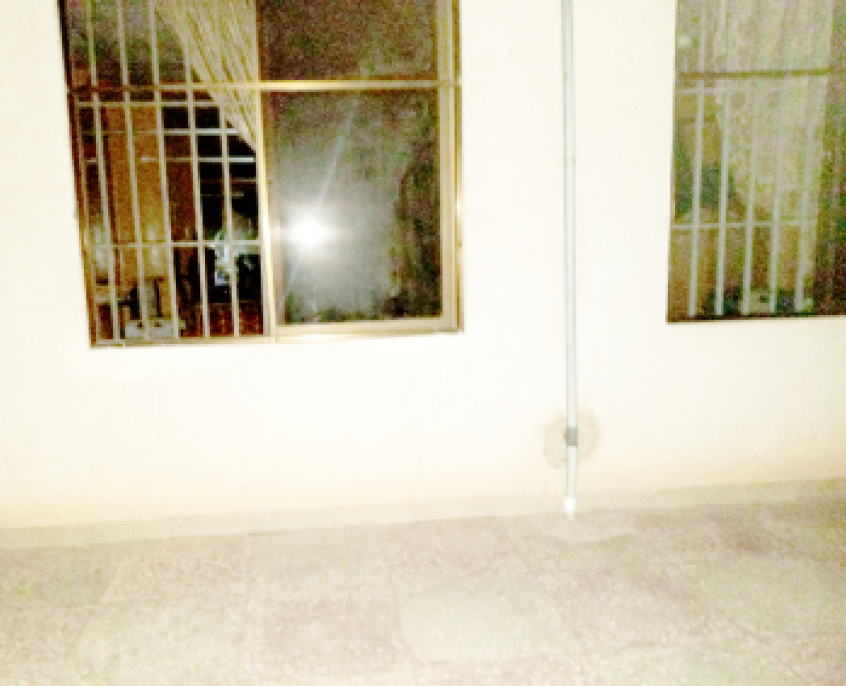In this piece, Daily Trust on Sunday reports the worsening plight of patients due to power and water problem at the University of Ilorin Teaching Hospital (UITH) despite management’s efforts to improve the situation.
Mrs Oyindamola Ajere was surrounded by sympathisers who consoled her over the death of her baby. She is one of those whose babies reportedly died recently as a result of the epileptic power and water shortage being experienced in the University of Ilorin Teaching Hospital. Speaking to our correspondent amidst tears, she said although she was pained by the incident, she had accepted the situation as her fate.
- Commonwealth gold winner, Nwokocha, provisionally suspended for doping
- Fuel tanker fire razes 10 buildings in Ogun
Also, Olagoke Shuaib said he lost his sister to excessive bleeding. He alleged that doctors on duty in the hospital refused to touch his late sister because there was no light to perform the operation.
Narrating the incident, Shuaib said, “It was an emergency case at the gynaecology ward. My sister was bleeding profusely but the doctors said they could not operate on her in darkness. Although I was embittered over their action, I understood their predicament.”
Speaking on the incident, a Servicom official said, “I have to move from ward to ward begging for fuel from other departments and offices and writing undertaken in the process.
“Unfortunately, the woman died and I was the one responsible for the payment of all the fuel I collected. The next time we had a similar case, I put the name of my head of department underneath the undertaken I wrote for the fuel.”
Daily Trust on Sunday gathered that there have been tales of woe, pain and anguish by patients and their relatives affected by the situation in the hospital. Some of them said they had to watch their loved ones die slowly as a result frequent postponement of surgeries or because of lack of electricity, water, oxygen and serious shortage of manpower.
Emmanuel Oyelowo said his brother and two other accident victims who were admitted at the emergency ward died because the only doctor on duty was overwhelmed by the situation.
He said, “One of them died few hours after admission. And before I came back from the lab to get blood for my brother, the other victim had passed on. My patient, who was supposed to be wheeled into the theatre immediately bled for hours, with the doctor struggling to attend to all of them. The most annoying thing is that they said the operating theatre was not ready. I later discovered that it had to do with the issue of light and water.
“Getting blood for my brother was another depressing and frustrating experience over this issue of no light. As I am talking to you now, I don’t know how my brother survived.”
Daily Trust on Sunday also learnt that the situation has claimed some medical officers. For example, one Dr Tope Alabi from the Department of Internal Medicine and a senior lecturer in Urology, reportedly died about six months ago as a result of lack of oxygen.

Last week, a female permanent secretary in the state was reportedly flown from the hospital to another facility on a helicopter because of lack of electricity to properly manage her case.
One of the medical staff who spoke in confidence on the issue said, “There are specialists on ground to manage her situation but there is lack of electricity and other amenities. A lot of patients have left because of the situation. There have been many deaths on account of the unavailability of oxygen, power, water, and shortage of medical personnel.
“There was a time we had to cancel many cases scheduled for operation because of lack of electricity at the theater. The scenario was repeated the following week. It has gotten to a stage that doctors are fed up.”
For Mr Owoniyi Omoniyi, it took his decision to personally fuel the hospital generator to save his pregnant wife from becoming a casualty. He said, “I brought my wife from a private hospital with a ruptured uterus, but by the time we came, there was power outage. The doctors and nurses were just looking at her because there was nothing they could do. Everywhere was dark and my wife had lost so much blood. Even if they tried to infuse her with blood, there was no power at the blood bank.
“I had to fuel the generator at the ward and lab before my wife could be attended to. The nurses and doctors there could not provide fuel with their salaries.”
An official who witnessed the incident said, “That was not the first time a patient would fuel the hospital generator. But thank God the gesture did not go in vain as she and her child survived. But it was a miracle. She lost a lot of blood because of her condition. Her ruptured uterus required surgery within two hours, but a lot of time was wasted.”
When our correspondent visited the hospital again on Saturday night, the main operating theatre and several other departments were in total darkness. A matron was heard lamenting the situation to doctors who had scheduled patients for operation.
She said, “Oga sent money for only five litres of fuel, which is barely enough for one operation; and we have three cases at hand. I have tried to make arrangement by calling other departments to see if we could get fuel, but it has not been fruitful. I would suggest we give each unit 60 litres to be distributed instead of sending N2,000 to buy a little quantity.”
One his part, one of the doctors complained, “I have been here since morning for an operation. I had to allow a colleague operate a patient who was on the verge of being paralysed if his case was delayed further. This is past 9:00pm and I still can’t operate on my patient.”
A medical doctor who preferred not to be named expressed fears over the situation thus: “We are afraid to move about in the hospital, especially during the night because it is very risky. We don’t know why it is difficult to use solar to power this hospital.
“Despite all these, there has been a continuous increase in charges. The UITH is now like a private hospital. The advantage is that we have specialists. On Monday, I couldn’t use the toilet due to lack of water. We have to get bags of sachet water. It is quite frustrating. Sadly, the patients often see us (doctors) as the bad guys.
“Most of the resident doctors in the Department of Paediatrics have become consultants; and they are not recruiting people. It is quite terrible. There is looming danger ahead in that section. In the Radiography Department, a lot of patients could not do their scans because of light, yet there is a private facility inside a government-owned hospital that has light 24 hours in a week, charging three times for its services when compared to the hospital.
“To get oxygen now you must show the receipt of payment, which ranges from N15,500 to N18,000, which will be taken to the oxygen plant before they would supply, unlike perforce that patients can pay later. A patient that is gasping for breath and doesn’t have enough money will likely not survive. If that happens, the management will put the blame on us.
“We have learnt our lessons and have now decided to always carry out “proper documentation.” Every lapse in the course of treating a patient is stated – whether there was no light, oxygen, drugs etc – so that it won’t cost us our licences.”
Another official who confided in our correspondent said surgeries took more time because of lack of electricity and oxygen. He said, “There was an incident that a doctor had to use his phone’s torchlight to perform a head surgery. We have about 8 suites (theaters) in the UITH, and with the present situation; it is difficult for two operations to go on simultaneously.”
Responding to the allegations, the public relations officer of the UITH, Mrs Elizabeth Ajiboye, said the hospital was initially affected by the epileptic power situation across the country, occasioned by the collapsed national grid and the astronomical rise in the price of diesel. She, however, said the university had responded swiftly to the situation.
“The collapse of the national grid was a general thing in the country and this affected our services. The sudden astronomical rise of the price of diesel also compounded the situation. But as a management that prioritises the heath of patients and wellbeing of workers, we immediately swung into action and have been practically working to ensure that the activities in the hospital are not grounded as a result of this challenge. We can’t just watch things happen like that.
“We have created an alternative to the situation of the erratic municipal power supply. We have purchased a diesel generating plant to power facilities and the hospital despite the hike in price. You can believe we use 10,000 litres of diesel daily,” she said.
She said the issue of water supply was affected by the epileptic power. She, however, added, “We have improved the situation as a result of constant pumping and supply to all serving points in the hospital.
“This is in addition to the water we supply to other places within the premises. Recently, we also purchased some fuel-powered generators and distrusted to all the sensitive places within the hospital. In fact, as we are speaking now, an operation is going on in the theatre.
“Our borehole is functioning, and right now, and we have electricity. The situation has improved through the efforts of the management.”
On the issue of solar and oxygen, the hospital’s image maker said, “We are working to connect directly to the hospital. The poles have already been brought, and before the end of the year, everything would be put in place. We have also improved tremendously on the situation of our oxygen.”




